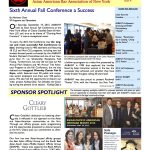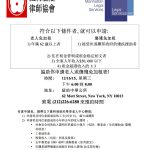Please see below a bulletin from Sarah Flatto, Director, Programs & Outreach, NYC Family Justice Center, Manhattan
80 Centre St. 5th Floor New York, NY 10013
Mayor’s Office to Combat Domestic Violence
o. 212 602-2857 | c. 646 280 8015
sarahf@fjcnyc.org |
www.nyc.gov/domesticviolence
The Manhattan Family Justice Center is happy to announce our next round of
core trainings. Our training program provides professional
development for service providers, community leaders, and city agencies
on relevant topics regarding intimate partner violence, sex trafficking,
and elder abuse.
Please feel free to share widely. All trainings are free and located at the MFJC: 80 Centre Street, 5th Floor Training Room.
REGISTER NOW!
Domestic Violence Dialogue
Facilitated by FJC Admin Staff, Monday, 1/11 10am-1pm
Risk Assessment & Safety Planning
Facilitated by Mayor’s Office to Combat Domestic Violence Staff, Tuesday, 1/12 10am-1pm
Cultural Conversations
Facilitated by FJC Admin Staff, Wednesday, 1/13 1pm-4pm
Criminal Justice Responses to DV
Facilitated by Manhattan DA’s Office & NYPD, Thursday, 1/14 10am-1 pm
Economic Empowerment
Facilitated by FJC Admin Staff, Friday, 1/15 10am-1pm
Immigrant Eligibility for Public Benefits
Facilitated by FJC Admin Staff, Friday, 1/15 1pm–4pm
Elder Abuse
Facilitated by JASA,Tuesday, 1/19 11am-1pm
Commercial Sexual Exploitation & Trafficking
Facilitated by GEMS, Tuesday, 1/19 2pm-5pm
Immigration Law
Facilitated by NY Legal Assistance Group & Sanctuary for Families, Wednesday, 10/20 10am-1pm
Family & Matrimonial Law
Facilitated by Urban Justice Center, Thursday, 1/21 11am-2pm
Housing & Shelter Options for Survivors
Facilitated by New Destiny Housing, Friday, 1/22 10am-1pm



